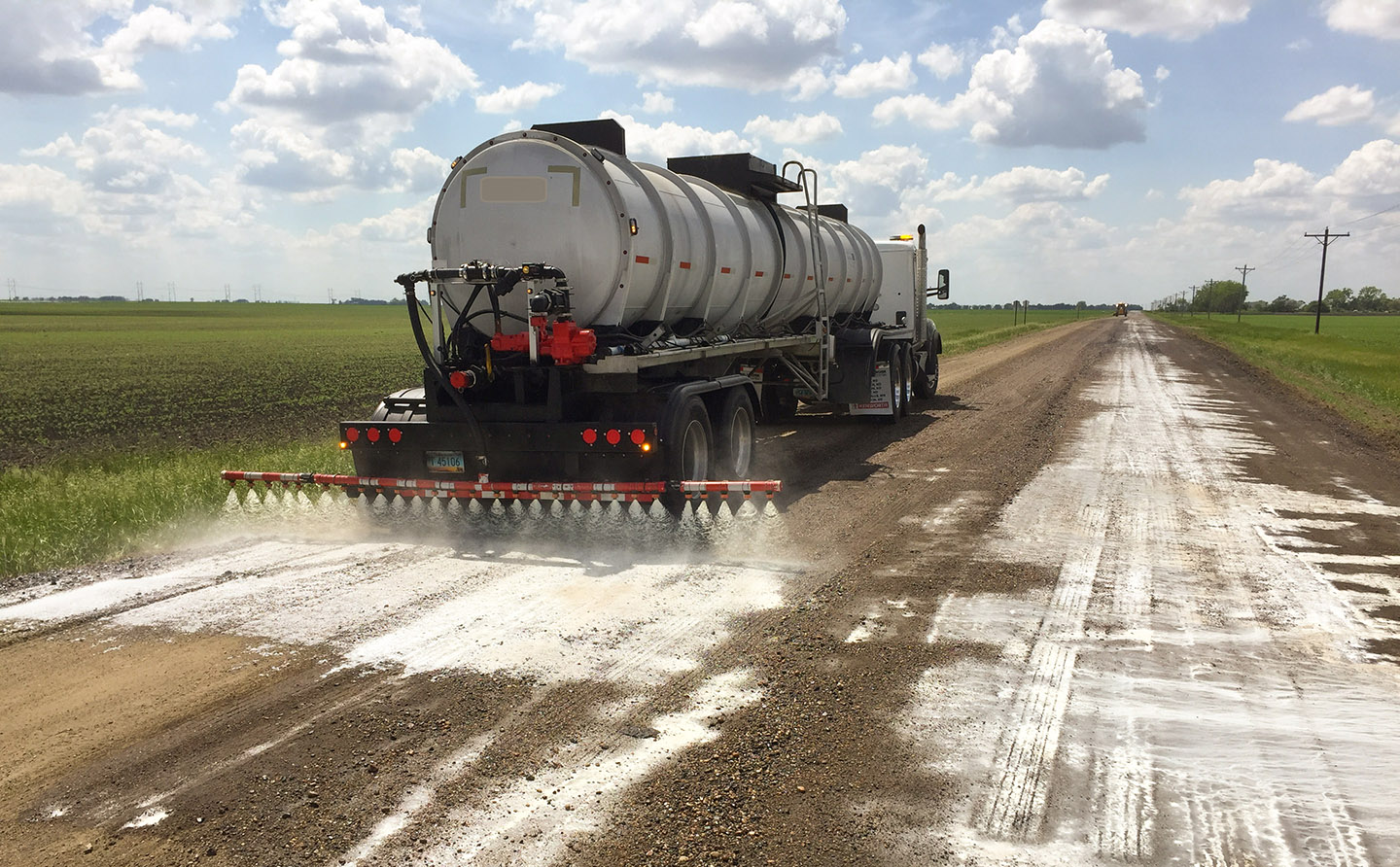Soy-based dust suppressant highlights important checkoff investment
May 26, 2022 | Brock Johnston
A new soy-based dust suppressant for roads, farms, construction sites and more presents a sustainable solution to improve air quality in rural and urban areas.
BioBlend Renewable Resources’ EPIC EL dust suppressant is one of many industrial use products hitting the market after receiving research funding from national and state soybean checkoff organizations, including the United Soybean Board (USB).
Using checkoff support, North Dakota State University researchers developed the initial chemistry now licensed for commercial use by BioBlend Renewable Resources, LLC, based in Elk Grove Village, Ill.
The result – a safe, biodegradable dust suppressant designed to compete with traditional chloride-based road applications.
Elevating soy
“Innovative, sustainable solutions continue to drive demand for U.S. soy,” says Brian Pierce, bioproducts development director at Smithbucklin, a primary contractor for USB. “A durable, soy-based dust suppressant is a natural choice for farmers, municipalities and businesses in rural and urban areas, to improve air quality, transportation safety and sustainability.”
The Federal Highway Administration estimates 35% of the nation’s roads or 1.3 million miles are unpaved. Dust created by vehicles and machinery using these roadways has long been an unavoidable source of airborne pollutants impacting rural and urban areas. However, dust and other particulates can impair air quality in local communities and for crops, livestock and pets.
The Environmental Protection Agency (EPA) has emphasized the importance of dust control due to the adverse effects on the human respiratory system.
Overexposure to air pollutants, including dust, is associated with numerous adverse health impacts and can create compounded challenges for individuals with preexisting conditions, including asthma.
Identifying areas where soy can be advantageous was instrumental in USB’s involvement to support additional trials and data collection of this new technology.

Sustainable alternative
Despite their performance and low cost, chloride-based dust control products may be falling short in addressing the growing consumer demand for products that also emphasize sustainability. Equipment corrosion and soil leaching have been associated with salt-based suppressants.
“From a USB perspective, new technology demonstrates the ability to provide a U.S.-sourced material that is efficient while also providing an environmentally conscious alternative,” says Pierce.
EPIC EL is comprised of soybean oil (25%) and glycerin, a coproduct of biodiesel production. Water (75%) is mixed to create the final emulsion applied to roadways. By utilizing the natural structure of soy oil molecules, the technology bonds road materials for stability and limits air particulates from escaping. Approximately 190 bushels of soybeans are used to create a single 275-gallon tote of EPIC EL concentrate, according to Todd Allison, regional business manager at BioBlend.
Because the dust control technology is 100% biobased, it also offers environmental benefits.
“In this instance, incorporating soy oil checks the box and more,” Pierce says.
As an odorless, water soluble product, BioBlend’s technology can be used in environmentally sensitive areas near crops, livestock, waterways and more.
Although the product is more expensive than traditional chlorides, Allison says sustainability and ease of use will continue to be major considerations for potential customers.
“This product is a great dust control alternative for individuals, businesses and municipalities looking for safe, easy-to-use, environmentally conscious solutions despite the increased cost,” Allison says.
Safety is key
More than 66,200 miles of Iowa roadways are gravel or Earth surfaced. Routine maintenance is necessary to keep vehicles and machinery of Iowa soybean farmers moving safely.
Without surface treatment, unpaved roads have an increased susceptibility to washboards and gravel loss. Approximately 1 ton of gravel is lost per vehicle across the United States annually.
The dust created by gravel loss presents a safety hazard to those using the farm-to-market transportation network. There are concerns that salt-based dust controllers commonly used to slow gravel loss are corrosive to equipment and vehicles, resulting in costly repairs for growers over time.
These same dust control products rely on moisture to activate and control dust. Soy-based suppressants hold road materials together without the presence of water or moisture.
“Since this product does not require moisture to remain effective, key performance enhancements are especially evident during periods of drought and in regions without much precipitation,” says Allison.
Looking ahead
With new uses for soy continuing to be uncovered, Iowa farmers are driven to meet the demand these uses create. “USB has been instrumental in assisting BioBlend to commercialize and bring this product to market,” says Allison. “We look forward to working with the United Soybean Board, state soy organizations and other stakeholders for many years to come.”
As farmers traverse farm-to-market routes, they should know their crops are being turned into an ingredient placed on the roads they travel daily.
Back